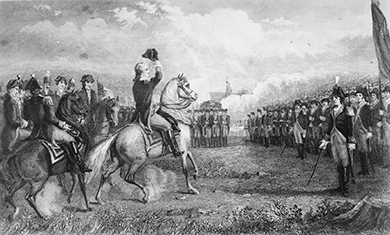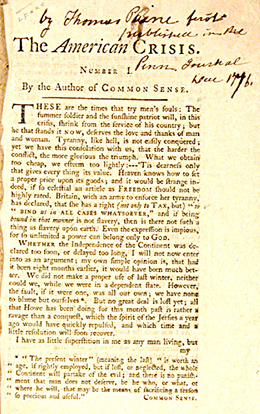| << Chapter < Page | Chapter >> Page > |
When the Second Continental Congress met in Philadelphia in May 1775, members approved the creation of a professional Continental Army with Washington as commander in chief ( [link] ). Although sixteen thousand volunteers enlisted, it took several years for the Continental Army to become a truly professional force. In 1775 and 1776, militias still composed the bulk of the Patriots’ armed forces, and these soldiers returned home after the summer fighting season, drastically reducing the army’s strength.

That changed in late 1776 and early 1777, when Washington broke with conventional eighteenth-century military tactics that called for fighting in the summer months only. Intent on raising revolutionary morale after the British captured New York City, he launched surprise strikes against British forces in their winter quarters. In Trenton, New Jersey, he led his soldiers across the Delaware River and surprised an encampment of Hessians , German mercenaries hired by Great Britain to put down the American rebellion. Beginning the night of December 25, 1776, and continuing into the early hours of December 26, Washington moved on Trenton where the Hessians were encamped. Maintaining the element of surprise by attacking at Christmastime, he defeated them, taking over nine hundred captive. On January 3, 1777, Washington achieved another much-needed victory at the Battle of Princeton. He again broke with eighteenth-century military protocol by attacking unexpectedly after the fighting season had ended.
During the American Revolution, following the publication of Common Sense in January 1776, Thomas Paine began a series of sixteen pamphlets known collectively as The American Crisis ( [link] ). He wrote the first volume in 1776, describing the dire situation facing the revolutionaries at the end of that hard year.

These are the times that try men’s souls. The summer soldier and the sunshine patriot will, in this crisis, shrink from the service of their country; but he that stands it now, deserves the love and thanks of man and woman. . . . Britain, with an army to enforce her tyranny, has declared that she has a right (not only to tax) but “to bind us in all cases whatsoever,” and if being bound in that manner, is not slavery, then is there not such a thing as slavery upon earth. Even the expression is impious; for so unlimited a power can belong only to God. . . .
I shall conclude this paper with some miscellaneous remarks on the state of our affairs; and shall begin with asking the following question, Why is it that the enemy have left the New England provinces, and made these middle ones the seat of war? The answer is easy: New England is not infested with Tories, and we are. I have been tender in raising the cry against these men, and used numberless arguments to show them their danger, but it will not do to sacrifice a world either to their folly or their baseness. The period is now arrived, in which either they or we must change our sentiments, or one or both must fall. . . .
By perseverance and fortitude we have the prospect of a glorious issue; by cowardice and submission, the sad choice of a variety of evils—a ravaged country—a depopulated city—habitations without safety, and slavery without hope—our homes turned into barracks and bawdy-houses for Hessians, and a future race to provide for, whose fathers we shall doubt of. Look on this picture and weep over it! and if there yet remains one thoughtless wretch who believes it not, let him suffer it unlamented.
—Thomas Paine, “The American Crisis,” December 23, 1776
What topics does Paine address in this pamphlet? What was his purpose in writing? What does he write about Tories (Loyalists), and why does he consider them a problem?

Notification Switch
Would you like to follow the 'U.s. history' conversation and receive update notifications?